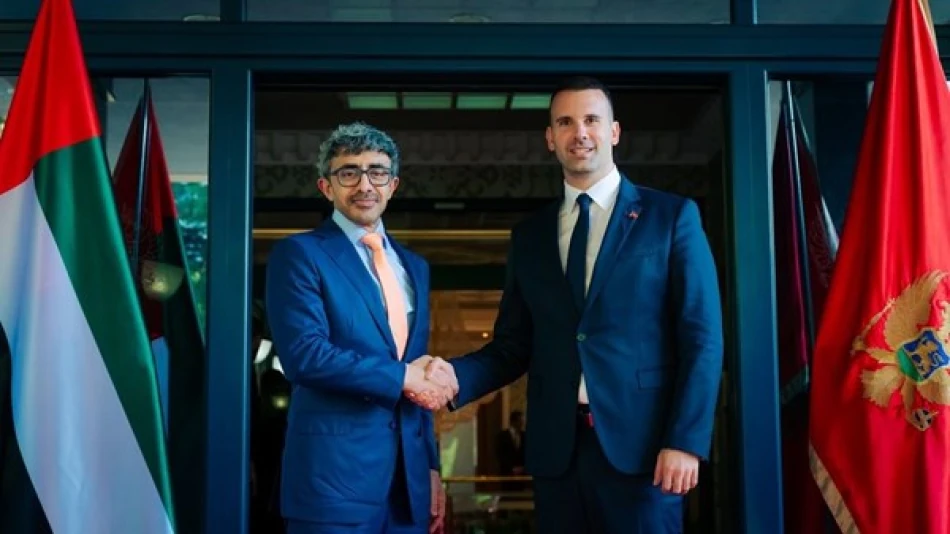
UAE Foreign Minister Meets Montenegrin PM in Podgorica, Discusses Bilateral Ties
UAE Deepens Balkan Ties as Sheikh Abdullah Visits Montenegro for Strategic Partnership Talks
The UAE is expanding its diplomatic and economic footprint in Southeast Europe, with Foreign Minister Sheikh Abdullah bin Zayed Al Nahyan conducting high-level talks in Montenegro's capital Podgorica. The visit signals Abu Dhabi's growing interest in the Balkans as a gateway to European markets and reflects the Emirates' broader strategy of diversifying partnerships beyond traditional Middle Eastern allies.
Strategic Sectors Drive Bilateral Cooperation
During his meeting with Montenegrin Prime Minister Milojko Spajić, Sheikh Abdullah outlined ambitious plans for cooperation spanning multiple strategic sectors. The discussions centered on renewable energy, food security, trade, and investment opportunities – areas where the UAE has demonstrated significant expertise and capital deployment globally.
The emphasis on renewable energy is particularly noteworthy, given Montenegro's hydroelectric potential and the UAE's position as a regional clean energy hub through initiatives like Masdar. This alignment could position Montenegro as a key partner in the UAE's European renewable energy strategy.
Why the Balkans Matter for UAE's Global Strategy
The UAE's courtship of Montenegro reflects a calculated approach to European engagement. Unlike larger EU markets where competition from established players is fierce, smaller Balkan nations offer the UAE opportunities to establish meaningful economic relationships with potentially outsized returns.
Gateway to European Markets
Montenegro's candidacy for EU membership makes it an attractive partner for Gulf investors seeking European market access. The country's strategic location along the Adriatic coast and its developing infrastructure present opportunities similar to those the UAE has successfully capitalized on in other emerging markets.
Diversification Beyond Traditional Partnerships
This outreach demonstrates the UAE's sophisticated diplomatic strategy of building relationships across multiple regions simultaneously. While maintaining strong ties with traditional partners, Abu Dhabi is actively cultivating new alliances that could prove valuable as global trade patterns evolve.
Economic Implications and Investment Potential
The presence of Saeed Mubarak Al Hajeri, Chairman of the Emirates Pharmaceutical Industries and Assistant Foreign Minister for Economic and Commercial Affairs, signals that this diplomatic engagement has immediate commercial objectives.
For investors and businesses, this meeting suggests potential opportunities in Montenegro's infrastructure, energy, and pharmaceutical sectors. The UAE's sovereign wealth funds and state-linked enterprises have historically followed diplomatic engagement with substantial investment commitments.
Broader Regional Context
The UAE's Balkan engagement comes at a time when traditional European powers are reassessing their relationships with the region. China's Belt and Road Initiative has already established a significant presence in the Balkans, while Russia's influence has waned following the Ukraine conflict.
This creates space for middle powers like the UAE to establish meaningful partnerships without competing directly with major global powers. Montenegro's relatively small economy means that even modest UAE investments could have significant impact, potentially giving Abu Dhabi disproportionate influence in the country's development trajectory.
The visit represents more than diplomatic courtesy – it's a strategic investment in relationships that could yield significant returns as Europe's energy landscape transforms and new trade corridors emerge in the post-pandemic global economy.
Most Viewed News

 Layla Al Mansoori
Layla Al Mansoori






